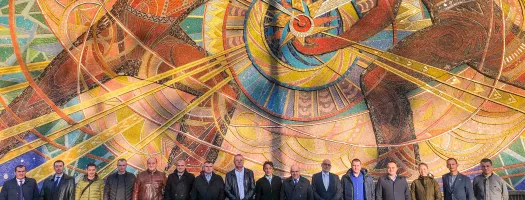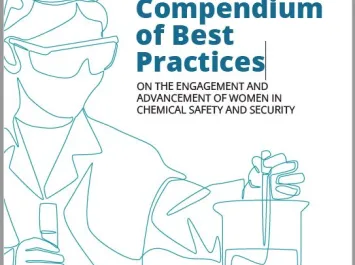A five-day train-the-trainers (TTT) session on preventing radiological and nuclear (RN) trafficking took place between 18 and 22 October. The United Nations Interregional Crime and Justice Research Institute (UNICRI) organized the event within the scope of the project “CONTACT: Enhancing capacities to prevent the trafficking of radiological and nuclear material in the Black Sea region.” The training, which took place in the George Kuzmycz Training Center for Physical Protection, Control and Accounting of Nuclear Material, was addressed to Ukrainian nuclear security practitioners in charge of responding to the illicit trafficking of radiological and nuclear (RN) materials. It was the third TTT event organized within the framework of the project. Mr. Maksym Samusevych, from the State Border Guard Service of Ukraine (SBGSU) and National Focal Point for the European Union Chemical, Biological, Radiological, and Nuclear (CBRN) Centres of Excellence (EUCBRN CoE) Risk Mitigation Initiative, facilitated the event's organization
Overall, 11 practitioners from various Ukrainian governmental agencies took part in the training, including practitioners from the Security Service of Ukraine, State Border Guard Service of Ukraine, State Nuclear Regulatory Inspectorate of Ukraine, George Kuzmycz Training Center for Physical Protection, Control and Accounting of Nuclear Material and National Police of Ukraine.
The training consisted of theoretical and practical exercises to give trainees a comprehensive view of the subject matter and to enhance their knowledge of RN materials subject to potential smuggling operations, detection equipment and principles, planning and conducting intelligence/law enforcement operations and radiological crime scene investigation. In addition, it enhanced participants’ skills in delivering lectures and sharing their knowledge with their peers.
“After intense preparations, I am happy to see the successful outcome of the CONTACT Black Sea national TTT session. I extend my gratitude to all Ukrainian governmental agencies for facilitating this training and George Kuzmycz Training Center for hosting the event. I would also like to thank the team of trainers, whose commitment and expertise was essential to the successful outcome of the initiative, as well as trainees, who were very active, knowledgeable and contributed significantly throughout the training. UNICRI is looking forward to a further partnership with Ukraine during subsequent stages of the CONTACT – Black Sea project,” - said Mr. Francesco Marelli, Head of UNICRI’s CBRN Risk Mitigation and Security Governance Programme.
“I am very grateful to UNICRI for the quality of the training on enhancing capacities to prevent the trafficking of radiological and nuclear material in the Black Sea region, in the framework of the “Contact-Black Sea” initiative. I am confident that the knowledge gained by the instructors will be an effective tool for disseminating best practices to other levels of specialists in this field within relevant State institutions. The cooperation with UNICRI is one of the priorities of the SBGSU and will help us anticipate and reduce the risks of illicit movement of nuclear materials. It strengthens the agency’s ability to respond to today's threats, especially in our region.” – said Mr. Maksym Samusevych, CBRN National Focal Point for Ukraine.
About the project
On the 1st of June 2020, UNICRI officially launched the project “CONTACT –– Enhancing capacities to prevent the trafficking of radiological and nuclear material in the Black Sea region”. The project aims to srenghten the capacities of security and law enforcement officials in Georgia, Moldova, and Ukraine to prevent and counter trafficking of radiological and nuclear (RN) material along with fostering regional cooperation and exchange of information on RN trafficking-related incidents. The project is implemented by UNICRI and jointly funded by the United Kingdom Department for Business, Energy & Industrial Strategy (UK BEIS), the Norwegian Radiation and Nuclear Safety Authority (DSA), and the U.S. Defense Threat Reduction Agency (DTRA).



